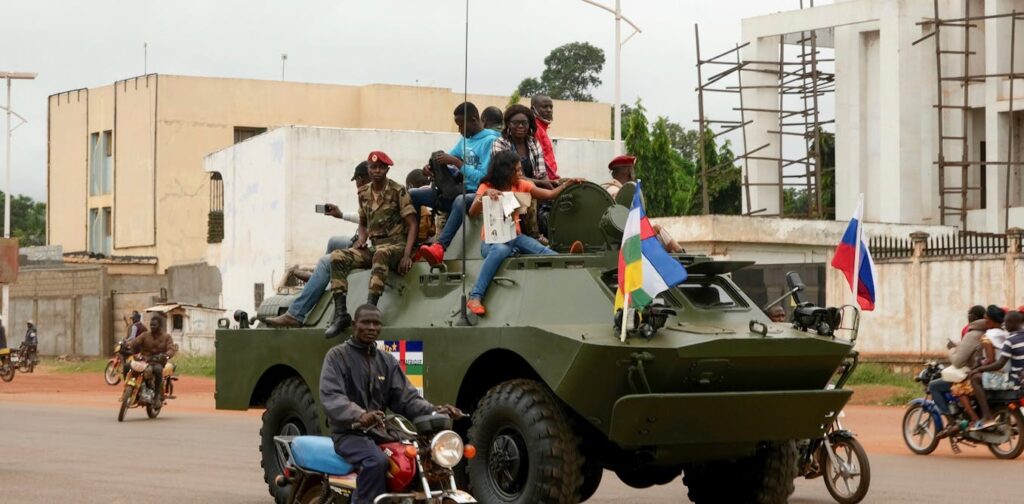In Summary
- Sudan’s estimate of 9,201 casualties tops the list as a result of the civil war between the Rapid Support Forces and the army marking it as Africa’s deadliest ongoing conflict by death toll.
- Notably, the Central African Republic stood out on this list due to the longevity of the civil war, which has spanned over a decade, showing how wars with low intensity can persist and be deadly.
- Five of the 10 countries causing violence are from Terrorist Insurgency, which can be linked to the jihadist attacks, mainly in the Sahel regions.
Deep Dive!!
In Africa, there are different causes of violence and how they affect each country. The wars often vary from Terrorist Insurgency, civil wars, and even intercommunal violence. While they can be different causes due to extremist movements, political tensions, or ethnic tensions, the consequences are mostly the same. Countries suffer from loss of life, displacement, disrupted economies, and strained public services. In West and Central Africa, especially, violence linked to terrorism has spread across other countries, leading to severe casualties simultaneously.
According to World Population Review, here are the highest numbers of recorded casualties in Africa as of 2024. This data does not just highlight the estimated numbers but it also reveals the types of conflict majorly driving these numbers. This also provides insight into how violence shapes a country.
10. Central African Republic

The Central African Republic records an estimated number of 536 casualties driven by civil war. The Civil War in CAR has spanned for years, starting from 2012 when the predominantly Muslim Seleka rebels dismissed the government, leading to a violent retaliation from Christian anti-Balaka militias. Over time, they’ve been peacekeeping forces controlling the situation, but the rural areas are still dominated by armed groups, and the civilians face the brutal consequences of displacement, extortion, ambushes, and even death.
9. South Sudan

After the independence of South Sudan in 2011, the country has faced different types of violence. The Country’s estimated casualties of 858 deaths are due to its ethnic clashes, especially between the Dinka and Nuer communities. South Sudan’s ethnic clash is mainly due to the thin line between politics and tribalism, thus causing severe regional war. Violence is often unpredictable, even after settling disputes, trivial matters like access to water, disputes over cattle, and local leadership lead to severe casualties.
8. Niger

Niger’s 1,469 estimated casualties are linked to the jihadists. Groups like ISIS and al-Qaeda have caused severe casualties in the country while also disrupting the western regions bordering Burkina Faso and Mali. Political instability also fueled the situation with the 2023 coup stretching government troops thin leaving the citizens vulnerable to attacks. The gunmen mostly attack the rural areas on motorbikes, making it easier for them to escape before reinforcement.
7. Cameroon

Cameroon records an estimated casualties of 1,561, and this stems mainly from separatist violence in the Anglophone southwest and Boko Haram’s operation in the North region. Cameroon suffers from two persistent forms of violence, creating severe insecurity among the citizens. Both conflicts linger in different regions contributing to the estimated number of casualties. The casualties are tied to Terrorist Insurgency.
6. DR Congo

The DR Congo conflict is quite complex. With the Allied Democratic Forces(ADF) and ISIS, the country’s estimated casualties of 3,503 are tied to Terrorist Insurgency. What mainly fuels this conflict in DR Congo is the mineral wealth. The armed groups often take over mining areas after extorting the mine workers. During the raids, civilians are often kidnapped for ransom, forced into labor, or killed in raids.
5. Mali

Mali’s 3,180 estimated casualties are also tied to jihadist attacks mainly in the North and Central regions. After the 2020 coup, the insecurity worsened with the new military government unable to control the vast, semi-arid territory. In Mali, the scale of terrorism is heightened. They often launch ambushes, military convoy attacks, and roadblocks. The citizens have also set up a local self-defense militia to control the situation, but sometimes this often fuels the cycle of retaliation.
4. Burkina Faso

The Burkina Faso conflict is one of the fastest deteriorating in Africa and is also tied to Terrorist Insurgency. The country records an estimated 6,241 casualties due to the extremist violence in the East and North. Burkina Faso has faced severe consequences from conflict, such as the massive massacre of an entire village, and the complete shutdown of health centers and schools. The government’s reliance on civil defense militias has led to human rights abuses, but has also helped slow attacks.
3. Nigeria

Nigeria’s 7,096 estimated casualties are also driven by the prolonged terrorist Insurgency in the North East. In states like Borno, Adamawa, and Yobe, Boko Haram and Islamic State West Africa province remain active despite government offensives. The evolution of these terrorist attacks is also alarming, as terrorists have moved past raid and suicide bombings to kidnap civilians in mass abduction and even carrying out complex attacks on military bases.
2. Ethiopia

With estimated casualties of 7,846 tied to the Tigray Conflict that started in late 2020. Although a ceasefire declaration was made, ethnic tensions and sporadic clashes continue in the North. The Civil War brought in neighboring Eritrea, regional forces, and federal troops. In Tigray, Oromia, and Amhara, there were reports of mass displacement, starvation, and human rights abuses beyond death.
1. Sudan

Topping this list is Sudan, with an estimated record of 9,201 casualties rooted in the civil war since the April 2023 clash between the Parliamentary Rapid Support Forces (RSF) and Sudanese Armed Forces. This crisis has led to a forced migration of over 8 million people and a disruption of the capital, Khartoum. Basic services have collapsed, Aid workers have been killed, and hospitals have been bombed. Unlike other African Conflicts, Sudan’s war is not about religion or ideology, but a brutal struggle for power between rival generals, and civilians are bearing the consequences.
https://www.africanexponent.com/top-10-african-countries-with-the-most-estimated-war-casualties/


